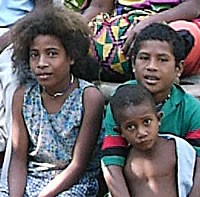Doura in Papua New Guinea

Photo Source:
Anonymous
|
Send Joshua Project a map of this people group.
|
| People Name: | Doura |
| Country: | Papua New Guinea |
| 10/40 Window: | No |
| Population: | 3,300 |
| World Population: | 3,300 |
| Primary Language: | Toura |
| Primary Religion: | Christianity |
| Christian Adherents: | 85.00 % |
| Evangelicals: | 16.00 % |
| Scripture: | Translation Started |
| Ministry Resources: | No |
| Jesus Film: | No |
| Audio Recordings: | No |
| People Cluster: | New Guinea |
| Affinity Bloc: | Pacific Islanders |
| Progress Level: |
|
Introduction / History
The Toura (or Doura) people live along the Hiritano Highway, NW of Port Moresby, the capital of Papua New Guinea. In some Toura villages, the houses are close together, but others, such as Veikabu, have houses sparsely scattered in along the highway.
The Touras' proximity to Port Moresby has provided them with access to some modern innovations. Technical modernization and westernization has been accompanied by weakening of the traditional chieftain system and loss of some traditional practices, such as rites of passage. However, some Toura customs are still in place. For example, after the arrival of the Catholic missionaries in the 1950s, the Toura people embraced Catholicism. While all Toura people are Christian in name, for many, Christianity does not play a role in their daily life. There are only a few lay workers in the church who maintain some church activities in between the priest's monthly visits. Despite the presence of Christianity, Toura people commonly retain belief in some aspects of their traditional religion.
Doura clans are Koabata, Varu, Karahu, Oaire, Aibu and the Naumaneha clan.